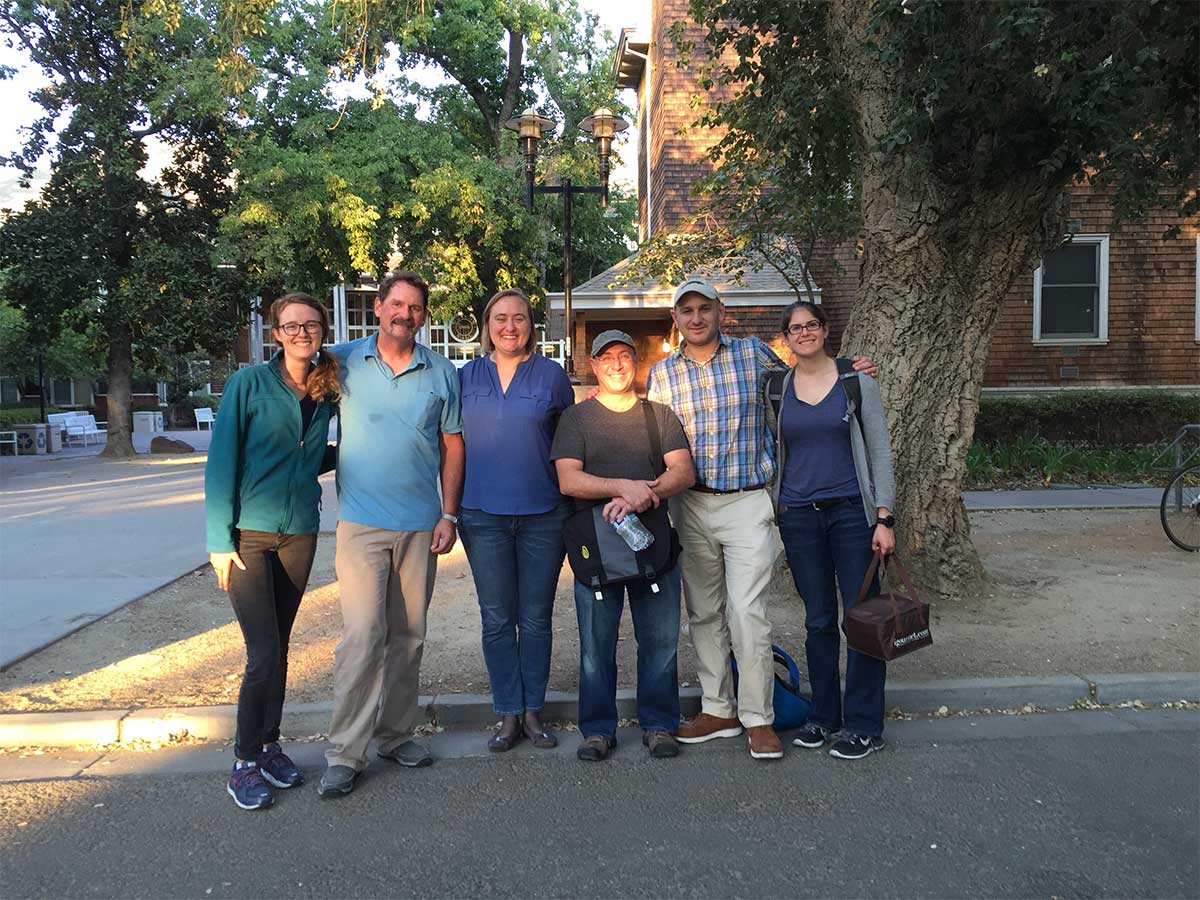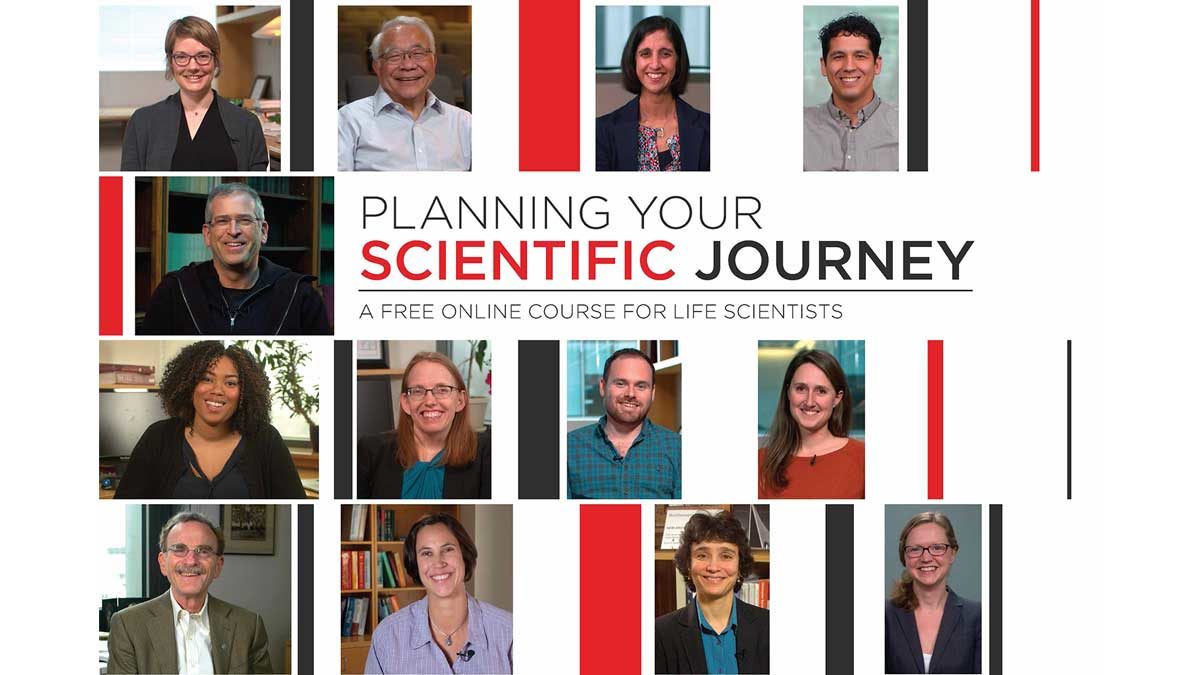Finding your path in science or any other career field is rarely a straightforward endeavor. As our Director of Career and Professional Development, Alexandra Schnoes has a knack for planning and spends her time creating meaningful tools to help scientists envision their futures. In our conversation she shares how she has found meaning in her own career by following her interests and creating resources for others that she wished she’d had along the way.

What does your role involve at iBiology?
In my role, I meld digital media (especially video) and career and professional development, primarily in the form of online courses. We’ve now built four online courses in the career and professional development space. I produce or co-produce everything from start to finish on these course projects, which typically take from a year to a year and a half in total. So that means everything from starting with the blank page, where we have just a vague idea of what we want the course to be; figuring out the learning objectives and the course outline; project managing and producing the interviews that we do; and writing the text at the end and planning out the learning experience.
What brought you to the work you’re doing now?
I went to grad school at UCSF and it’s actually a fairly small campus since we don’t have undergrads. One of the things I had been doing to get involved and sort of to keep myself sane was working in graduate student government. I had never really been interested in student government before, but I realized that you could actually make an impact on the campus and try to make things better for students and, and, well, everyone on campus. I ended up spending a lot of time building and supporting events that were centered around career and professional development.
I don’t think I’m unique in this way, but I think I’ve always been drawn to try to build things that I wished had existed for myself. So one of the first projects I started working on after I finished my Ph.D. was to help found an internship program for grad students where they could do internships in all sorts of different careers. I was passionate about the project because it was something I know would have been useful for me, and it felt really meaningful to build something that I knew was going to be useful to other people.

You’re quite the career and professional development expert these days. Has that always been a focus for you?
Not exactly. I came into grad school being pretty sure I didn’t want to be an academic, and thought maybe I’d work in industry. But then when I realized that long-term research wasn’t really what I was interested in doing, I didn’t really know what was next. And I kind of hoped that I would just sort of figure it out. Like I’d just sort of be in grad school long enough and eventually it would just sort of come to me. And that just isn’t normally how it works. The people who know exactly what they want to do or find it really quickly are very lucky in my opinion.
My path has really been about following what was interesting. A big piece of advice that I try to give people now is to allow yourself to follow your interests, even when you don’t necessarily know where they’re going to go. With student government I was just organizing dinners where maybe ten alumni would come to campus and they’d sit with students and talk about their careers. It was simple, but I was interested, it was something that I could do, and gave meaning to me. And that interest and sense of purpose has led to an entire career that I certainly had no idea was possible.
What has been your favorite project you’ve worked on?
Hmm, it’s really hard to pick. Our last course, Share Your Research, was such a labor of love, not only for me, but for the entire team. Talking about how to present research and helping scientists learn how to talk about their work is a big part of our mission. So it really was a privilege to be able to work on that course and be able to bring that out from our organization.

But, if we’re going to talk about real favorites here, I think our very first course that we did, Planning Your Scientific Journey, really stands out. At the time we had no idea what we were doing other than we knew we wanted to do something very, very different. We thought it would be really engaging and really meaningful, especially for this kind of content, to build course videos off of interviews. A sort of standard didactic ‘telling someone what to do’ just didn’t seem really productive or helpful in this context. So we chose to build a course using documentary-style videos instead of lectures. It was completely out of our comfort zone but so exciting to see this professional development content come alive in these new style of videos.
We’ve put so much into every project, so there’s a lot that I really have an emotional attachment to. But, I’m really happy with how that first course turned out and it set up so much of what we did after that, so it’s still probably my favorite.
You had a really successful launch and hosted run of Share Your Research this year, and it will be available as a self-paced course soon. What’s next on the horizon for you?
In the midst of getting our latest course out, we had the great blessing of being awarded a new grant! It’s this funding mechanism through the NIH called Innovative Programs to Enhance Research Training (IPERT), and the project is to build two online courses to help beginning graduate students find, recruit, and maintain really great relationships with mentors. We’re collaborating with some really amazing colleagues at the University of Wisconsin, Madison, Janet Branchaw and Amanda Butz.
I think probably anyone in research knows that the mentee-mentor relationship is incredibly powerful and key for people’s success. But it can be really hard to know how to find the right mentor for you. It isn’t necessarily just a really nice person and it isn’t necessarily just the person who’s doing the coolest science. Everyone’s needs are going to be a bit different, and so we’re building these two mentee training courses to help navigate those research relationships. And we’re focusing right at the transition from undergrad to grad, because that’s a period of time when people are first starting to build some of these really serious and important relationships, but they probably haven’t had much experience or any training around how to do that. So we’re really excited to build innovative courses that highlight personal stories, input from professionals who think about mentoring all the time, and trainees and faculty who are living it.





Leave a Reply